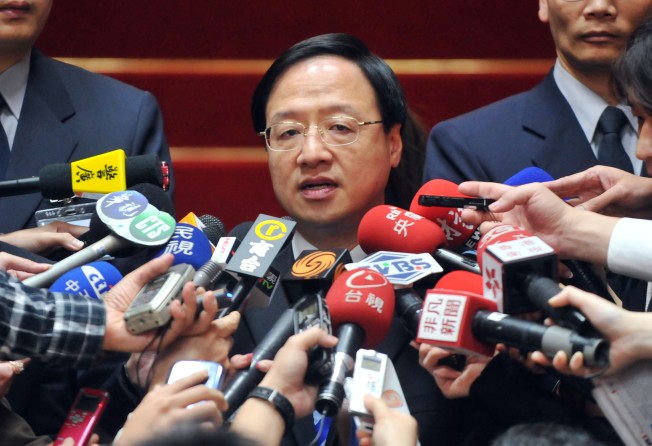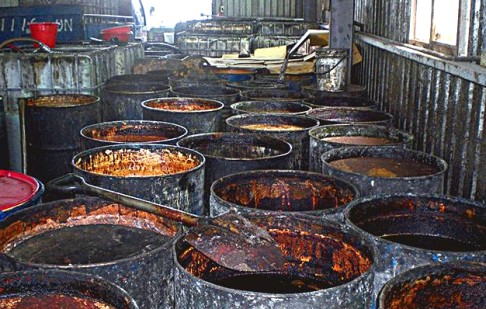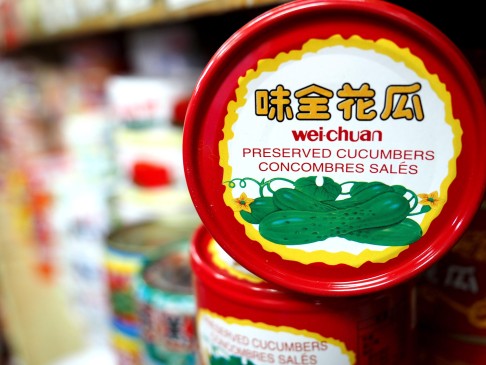
Taiwan premier bans sale of 235 food companies’ products as ‘gutter oil’ scandal grows
At least 240 tonnes of the oil – recycled from kitchen waste and pig skin by unlicensed factory – were sold to Chang Guann, which supplied food makers, schools and eateries in 22 cities and counties

Taiwanese Premier Jiang Yi-huah today ordered all food and oil products produced by 235 local food companies removed from shelves before Monday, as new findings showed these firms all used “gutter oil” – not suitable for human consumption – bought from a supplier at the centre of a food scare.

Chang Guann – a well known Taiwanese supplier of edible oil – used this gutter oil to produce 780 tonnes of edible lard oil, which is sold to a great number of food companies, eateries, night markets, schools and military compounds in 22 cities and counties in Taiwan, a government spokesman said.
“Premier Jiang was pained to find such a serious irregularity and ordered that relevant authorities and agencies continue their inquiries into the case and mete out severe penalties against those involved in the scandal,” Cabinet spokesman Sun Li-jen said.
He said Jiang convened an emergency meeting early on Friday afternoon with the justice, health, economics, environmental and agriculture ministries to unify government efforts in tackling the case, including finding out whether any of these products had been sold overseas, and what remedies should be taken.
The scandal was uncovered when police raided the unlicensed factory on September 1. They arrested six people, including the factory owner, a deputy manager of Chang Guann, and the owner of an animal feed manufacturer Ching Wei Co, which had allegedly bought gutter oil from the same factory for use in its pig feed products.
They were bailed by Pingtung District Court, pending further inquiries, prosecutors said.
Premier Jiang was pained to find such a serious irregularity and ordered that relevant authorities and agencies continue their inquiries into the case and mete out severe penalties against those involved in the scandal
Police said the unlicensed factory had more than 10 factories in Pingtung and Kaohsiung.
The scandal has alarmed many people because so many well-known food companies and eateries have been found to have used the gutter oil.
Local health and food departments were flooded with calls from the public criticising them for failing to uphold proper levels of food safety.
Taiwanese food giant Wei-Chuan has admitted that 12 types of its dried meat floss and meat paste were made using “gutter oil” bought from Chang Guann and had been removed from shelves. Wei-Chuan said it had started buying oil from Chang Guann in April last year.
Kaohsiung-based Chang Guann was found by police to have bought the gutter oil from the unlicensed factory in Pingtung at a price lower than normal market levels, and used it as the base oil in food production.
Chang Guann’s chairman Yeh Wen-hsiang, made a public apology on Thursday. His company also released a statement, saying that it had bought the oil in question from the factory since February 25.
“As of last month, a total of 243 tonnes of lard had been bought from the factory, 216 tonnes of which have been used as a base oil in the manufacturing of 780 tonnes of edible lard oil,” it said.
In Hong Kong, Sophia Chan Siu-chee, the undersecretary for food, said today that Hong Kong’s government was very concerned about this latest food scandal in Taiwan.
Hong Kong’s Centre for Food Safety was “following up and checking records to make sure these related food products are not on sale in Hong Kong”, she said.
Chan added that the centre would also carry out a review to consider whether existing laws governing the regulation of such products were adequate.
Additional reporting by Timmy Sung

